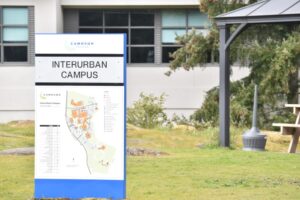Earlier this year, the District of Saanich approached Camosun College to discuss the possibility of opening a food hub at its Interurban campus. While the college is exploring the idea, it’s also clear that there’s a lot that needs to happen before this idea could become a reality.
The food hub would offer a space and resources for local businesses to use for food and beverage processing.
Camosun College vice president of partnerships Geoff Wilmshurst doesn’t pretend to be an expert on the inner workings of food hubs. He does, however, see the value for one at Camosun.
“My understanding is this—a food hub is a physical location that would allow local food producers to be able to process their food items so that they could be sold in a marketplace,” says Wilmshurst. “And there’s more to it than that, obviously, and there would be some sort of support for that that the hub would provide.”

There are a few roadblocks in the way of opening a food hub at Camosun, an important one being money. A feasibility study conducted by Greenchain Consulting found the estimated cost to establish the project to be roughly $7.2 million, but Wilmshurst feels that this might be a low estimate.
“What I would say is that, you know, there’s no money,” Wilmshurst says. “There’s no money that comes with this wonderful idea. So, it’s a wonderful idea… I think it fits our mandate as a as a community college. It certainly fits in terms of our Culinary Arts program, and our interest in food security, and all of that. But it’s an idea that has no money with it, and that’s an issue, right? We have no funds to be able to even contemplate starting something like this.”
While Camosun is looking for funding partners to overcome the obstacle of cost, there’s also the possibility that there just isn’t enough space at Interurban (which, according to recommendations from the feasibility study, would have to be around 12,000 square feet, with room for growth).
“The bottom line is there has to be some kind of entity, whether it’s government or private, that has an equal interest to us, and to the District of Saanich, who wants to actually put money behind it and make it happen,” he says. “And even then, where could we locate something like that? I mean, we do have some land, at Interurban, but most of that land is spoken for in our campus Master Plan. So, it’s not like we have acres and acres of land that we can put towards something like this. We have maybe a couple of locations that would work but, again, would have to come with money.”
While a food hub would support local business, it would also have to provide a learning environment for Camosun students in order to be considered.
“I think there’s certainly going to be potentially some educational opportunities there,” says Wilmshurst. “And, you know, I think that’s going to be an important part of, if we get into this, there’s going to have to be a connection to the institution educationally. Being a standalone entity that has no connection to the college just won’t work.”
Wilmshurst has created a task force to address these main issues and hopes to have an idea on whether or not a food hub is feasible at Camosun within the year.
“I’m calling it a task force because I want to keep it tight and with a real plan, because committees can last forever and not get anything done,” says Wilmshurst. “So, task force means we’re going to have a very short timeline. And I think it’s more than reaching out to see where there’s money, but we also have to do a little more internal work to understand is it even possible, right? We have more work to do. So, you know, it’s one of these things that is a fantastic idea. I hope it happens. If it doesn’t happen at Camosun, I hope it happens somewhere on the Saanich Peninsula, because I think it’s needed.”
